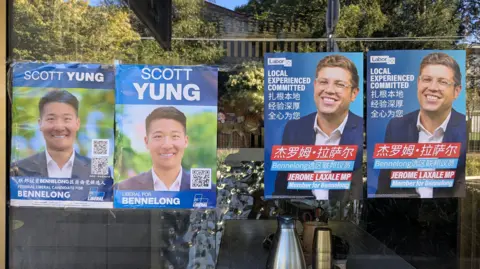Why Australia's opposition is vying for votes on Chinese social media
 BBC/Kelly Ng
BBC/Kelly NgWith days left to the election, Australian opposition candidates have been wooing a crucial group that turned its back on the conservative Liberal-National coalition in the last election: Chinese Australian voters.
And they are trying to reach them on platforms that their party once talked of banning over national security concerns: Chinese social media apps like WeChat and RedNote.
Nearly six in 10 Chinese Australians use WeChat at least once a day, according to a poll by Lowy Institute in 2022.
Grange Chung, who is contesting the New South Wales' seat of Reid, held by the left-leaning Labor party with a 3.2% margin, said in a video on WeChat that he chose to start his career in the navy "to give back to the country that embraced my family when we arrived with very little".
"Australia gave us a home... Let me finish what I started," he said in a video montage that included scenes of him putting up campaign posters and interacting with the electorate.
Despite making up just 5.5% of Australia's population, Chinese Australians were said to be a crucial to the Labor party's win in 2022, which broke nearly a decade of rule by the Liberal-National coalition.
Chinese Australians have traditionally leaned conservative, but in several seats with large Chinese Australian populations, the Liberals saw swings away three times larger than in other seats.
Some analysts say the community turned its back on the Coalition because they felt its government did not handle racist attacks well during the pandemic, while others point to the then-Prime Minister Scott Morrison's anti-China rhetoric.
And now, with their chances of winning narrowing, according to polls, Liberal candidates have been stepping up their battle for votes in marginal seats, many of which have large populations of Chinese Australians.
In order to be in with a chance of winning Reid, Grange Chung knows he needs to win over the suburb of Burwood, an area often billed as Sydney's second Chinatown, with Mandarin and Cantonese dominating conversations and the signboards for shops and restaurants.
A former commercial pilot, Chung started posting on WeChat in February and has in recent months shared his interviews with Asian business owners, Lunar New Year greetings, and his promises to the community, where about one in five voters are ethnically Chinese. One post saw him quoting Sun Tzu's philosophy.
He is far from the only Liberal candidate to target the platform, with University of Melbourne researcher Fan Yang finding more than 220 authorised Liberal ads had been placed on WeChat since January, compared to about 35 for Labor.
 BBC/Kelly Ng
BBC/Kelly NgHenry Luo, secretary of the Reid Business Community, says he has observed more "extensive targeting" of Chinese Australian voters in this campaign, including candidates displaying ad banners on popular WeChat accounts and collaborating with well-known Chinese celebrities or influencers.
"I think it is an effective platform to reach the Chinese-speaking community. We discuss and debate plenty of political issues on WeChat," says Mr Luo, who moved to Australia for work in 2008.
Even non-ethnic Chinese politicians have established a presence on the platforms, sharing videos of themselves enjoying Chinese cuisine and festivals.
Liberal MP Keith Wolohan's channel has clips of him celebrating the Dragon Boat Festival with his kids and enjoying spicy Hunan food with his father. Wolohan is defending his marginal seat in Menzies, Victoria.
But visibility on Chinese apps is not guaranteed to translate to votes, says Qiuping Pan, a lecturer in Chinese Studies at the University of Melbourne.
The Chinese Australian electorate have become more "politically mature", she says, adding that many may instead consider voting for independent candidates, whom some believe can better advocate for local communities because they do not tow party lines.
"Based on the last election, they know that their votes are important and have an impact. When they are portrayed negatively, they know they can fight back," she says.
Some are frustrated that the community is being "seen merely for votes".
"When Chinese Australians want to be politically involved at a deeper level, we are sometimes cast as suspicious characters," says Sydney resident Erin Chew.
She points to how Liberal senator Jane Hume recently accused Asian volunteers for independent MP Monique Ryan of being "Chinese spies".
"This sort of narrative has been normalised by politicians and the media, which is why Australia's political environment is so problematic," she says.
 BBC/Kelly Ng
BBC/Kelly NgThese are precisely the concerns that candidates want to address on their social media channels.
In the New South Wales' seat of Bennelong, where nearly one in three people have Chinese ancestry, Liberal contender Scott Yung has his WeChat posts overlayed with Mandarin subtitles and audio translation.
It is likely to help him reach more voters: English proficiency is low - at about 25% to 26% - among Australians who primarily speak Mandarin or Cantonese at home, according to government data.
In 2022, Labor snatched the Liberal stronghold seat for only the second time in more than 70 years. It now holds Bennelong by a razor-thin margin.
A recent clip shows Yung, who runs an education business, stressing what he calls the "so, so important" relationship between China and Australia: "It's important for Australia, it's important for Australian businesses."
How the country manages its ties with China has an everyday impact on the lives of Chinese Australians, says Osmond Chiu, a research fellow at the Victoria-based Per Capita think tank.
"[The community's] concerns will include increased racism, the effect on those who do business with China and what it means for people with family in China," he says.
For some voters, the Liberals' campaign blitz on social media does not sync with its anti-migrant rhetoric. "[Coalition leader] Peter Dutton has talked about slashing migration and international student numbers. We're feeling quite anxious about it," says Alex Wang, who works at a restaurant in Reid.

